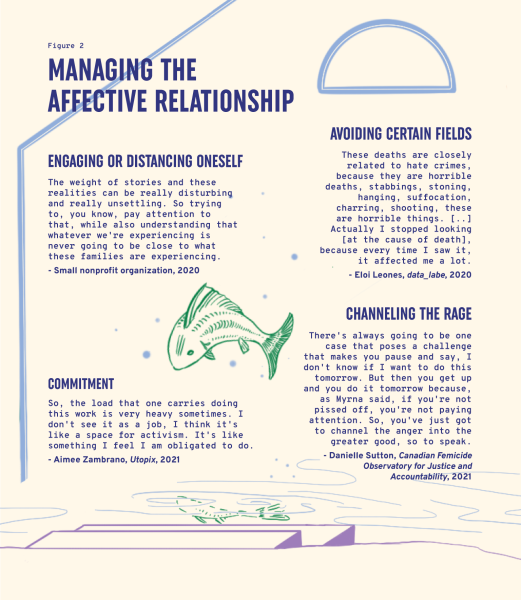Co-designing AI and machine learning systems to help civil society detection of gender-based violence.
Organized in collaboration with Feminicido Uruguay, The Latin American Initiative for Open Data (ILDA), and The Data Culture Lab
Feminicide (or femicide) is the gender-related killing of women and girls. In the face of missing data about feminicide, civil society organizations across the Americas are doing the work that states have neglected, collecting data about cases of feminicide from news reports and other sources.
Data Against Feminicide works to network these organizations and co-design artificial intelligence technology with them. It benefits from strong civil society partners including ILDA and Feminicidio Uruguay.

Principal Investigator
Catherine D’Ignazio
Partners
- Rahul Bhargava and the Data Culture Lab @ Northeastern University
- Media Cloud, based at Harvard, UMass Amherst, and Northeastern Universities
Student Researchers
Isadora Cruxên, Ángeles Martinez Cuba, Alessandra Jungs de Almeida, Melissa Q. Teng, Wonyoung So, Tiandra Ray, Valentina Pedroza Muñoz, Harini Suresh, Amelia Dogan, Soyoun Kang, Niki Karanikola, Patricia Michelle García Iruegas, Mariel García-Montes, Ana Amelia Letelier, Rajiv Movva, Luciana Ribeiro da Silva, and Thuận Tran
Co-designing Computing Tools For Feminicide Data
For the past four years, we have been co-designing two tools for activists and organizations to use to monitor feminicide cases from news articles.One is an email alert system to notify monitoring organizations about potential feminicide cases reported in the news in near-real time. The other is a highlighting tool that helps you to quickly scan news articles on the web to see if they have information relevant to your database.

We have conducted more than 40 interviews with civil society groups that monitor feminicide across North and South America. We have run 10 participatory design workshops and pilots in Spring 2021 with seven groups and Spring 2023 with five groups in Brazil.
I drew from our extensive qualitative and participatory work on theData Against Feminicide project to write my second book, Counting Feminicide, which will be published by MIT Press in 2024.
email-s-desktop-01
Growing a Global Community of Practice around Feminicide Data
My collaborators and I are commited to not only building technical infrastructure for this important work, but also helping to build social infrastructure in the form of a community of practice.
To this end, we hosted the first annual gathering of the Data Against Feminicide network in November 2020 with the Latin American Open Data Initiative (ILDA) and Feminicidio Uruguay. Programmed around the International Day for the Elimination of Violence against Women, the month-long virtual event series consisted of weekly interactive sessions, panels and workshops.

More than 500 people registered for the first annual gathering of the “Data Against Feminicide” network in November 2020. More than 200 people participated in each of the public sessions.
Due to the demonstrated interest, we plan to make this an annual virtual, global event. The long term aim is to foster a community of practice, create connections, support each other, and build a common roadmap for action to continue developing the production of feminicide data and promote good data practices around feminicide to raise awareness of this problem.

Publications
- D’Ignazio, Catherine, Isadora Cruxên, Helena Suárez Val, Angeles Martinez Cuba, Mariel García-Montes, Silvana Fumega, Harini Suresh, and Wonyoung So. “Feminicide and counterdata production: Activist efforts to monitor and challenge gender-related violence.” Patterns 3, no. 7 (2022): 100530.
- Suresh, Harini, Rajiv Movva, Amelia Lee Dogan, Rahul Bhargava, Isadora Cruxên, Ángeles Martinez Cuba, Guilia Taurino, Wonyoung So, and Catherine D’Ignazio. “Towards Intersectional Feminist and Participatory ML: A Case Study in Supporting Feminicide Counterdata Collection.” In 2022 ACM Conference on Fairness, Accountability, and Transparency, pp. 667-678. 2022. Winner of Best Student Paper Award.
- D’Ignazio, Catherine. “Human- Centred Computing and Feminicide Counterdata Production.” In The Routledge International Handbook of Femicide and Feminicide, edited by Saide Mobayed and Myrna Dawson. Routledge, 2023.
- Suárez Val, Helena, Catherine D’Ignazio, and Silvana Fumega. “Data Against Feminicide.” In Making a Difference! Novel Research Methods in the Datafied Society, edited by Mirko Schäfer and Tracey P. Lauriault, 2024.
- Bhargava, Rahul, Harini Suresh, Amelia Lee Doğan, Wonyoung So, Helena Suarez Val, and Catherine D’Ignazio. “News as Data for Activists: A Case Study in Feminicide Counterdata Production.” Computation + Journalism Conference, 2022.
- Suárez Val, Helena, Angeles Martinez Cuba, and Catherine D’Ignazio. “Feminicide Data, Emotional Labor and Self-care.” Backchannels blog from the Society for Social Studies of Science (4S). 2022.
Two of three illustrated sets of quotes, created for the “Feminicide Data, Emotional Labor and Selfcare” article written by Helena Suárez Val, Angeles Martinez Cuba, and Catherine D’Ignazio for the Backchannels blog from the Society for Social Studies of Science (4S), 2022. Article and figures available in English, Spanish, and Portuguese. Illustration by Melissa Q. Teng.
Awards
- Best Student Paper Award, ACM Conference on Fairness, Accountability, and Transparency, 2022.
- MIT SA+P Hass Award, 2020.
- MIT SA+P Hass Award, 2021.
- New Horizons Award, Mechanism Design for Social Good (MD4SG) 2020 Workshop.
Website
Locations
Latin America (primary)
North America (secondary)


